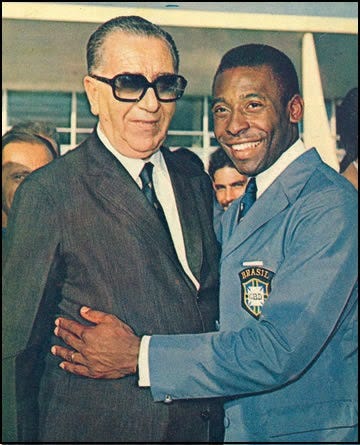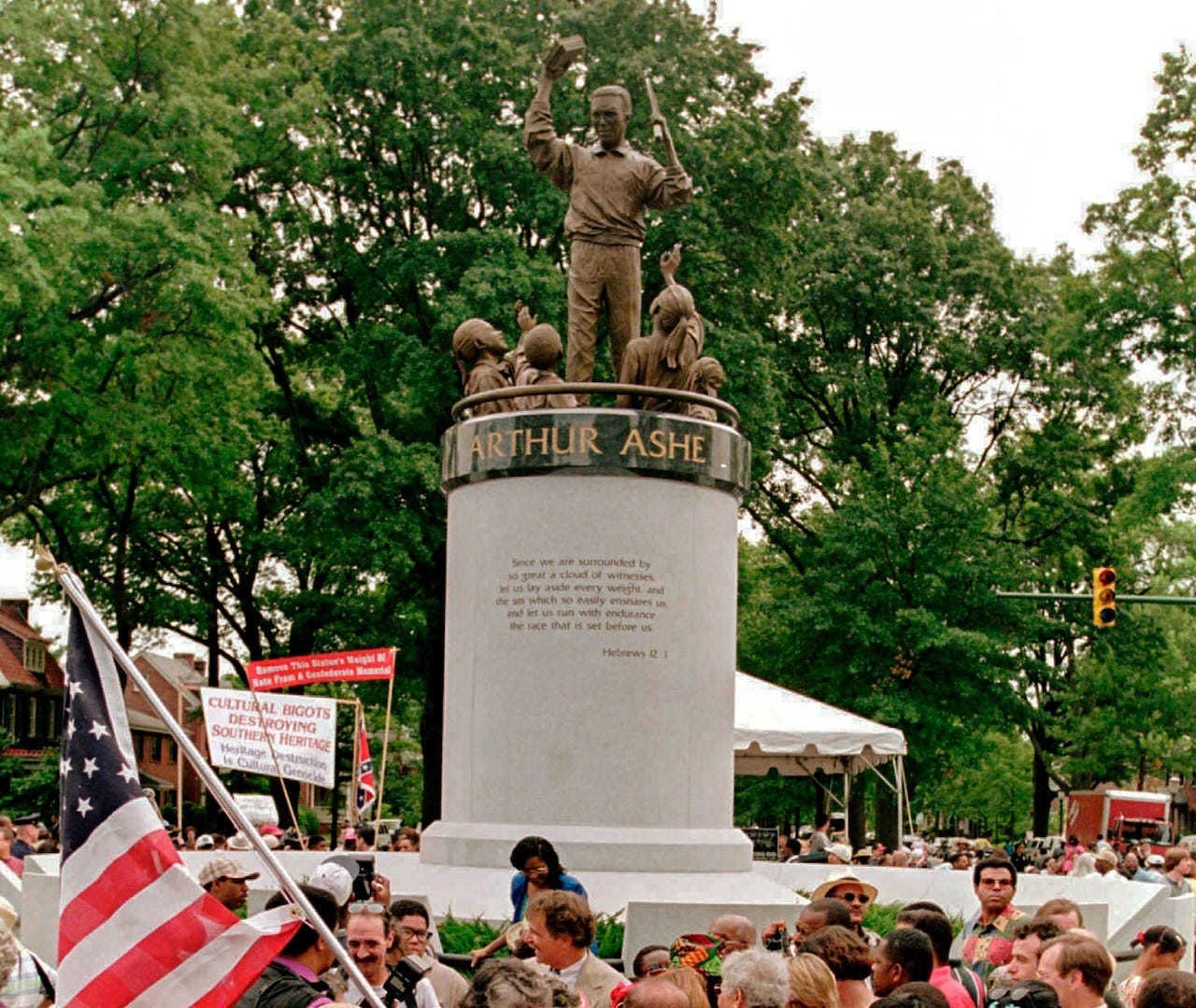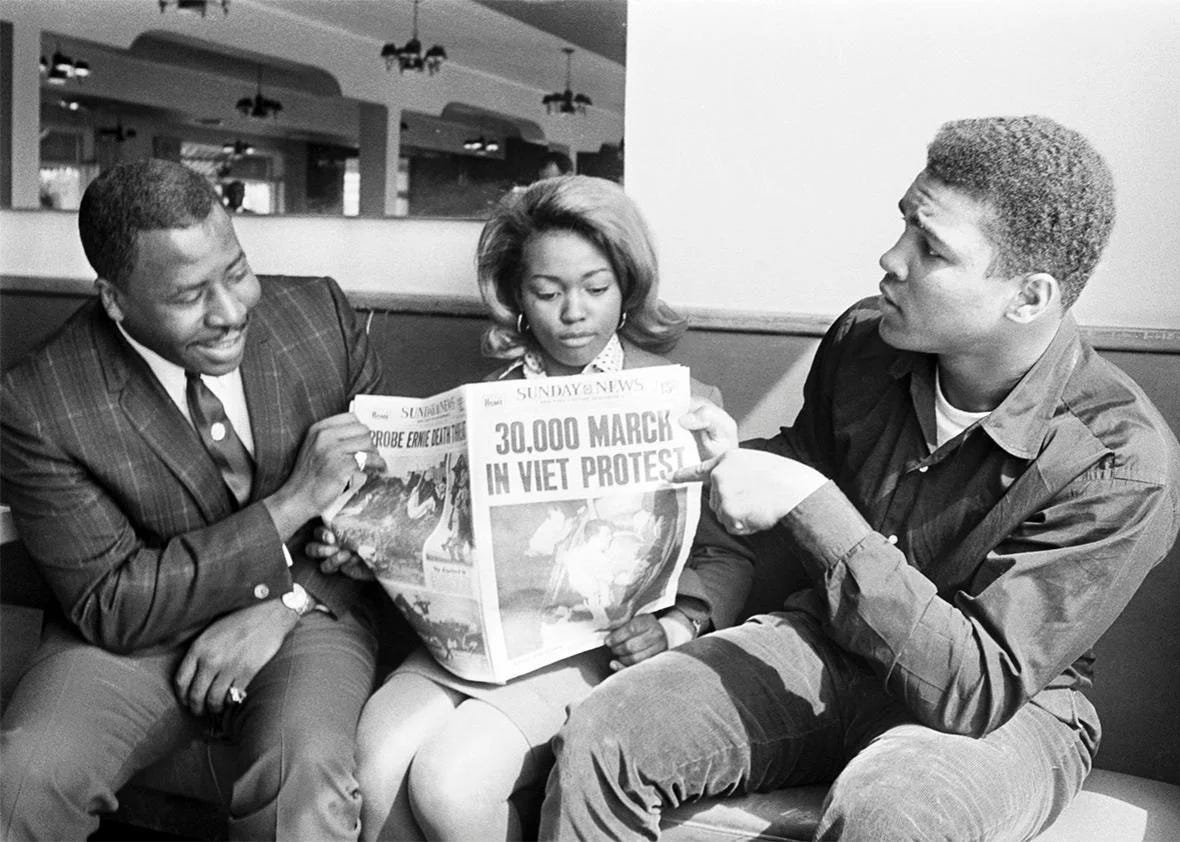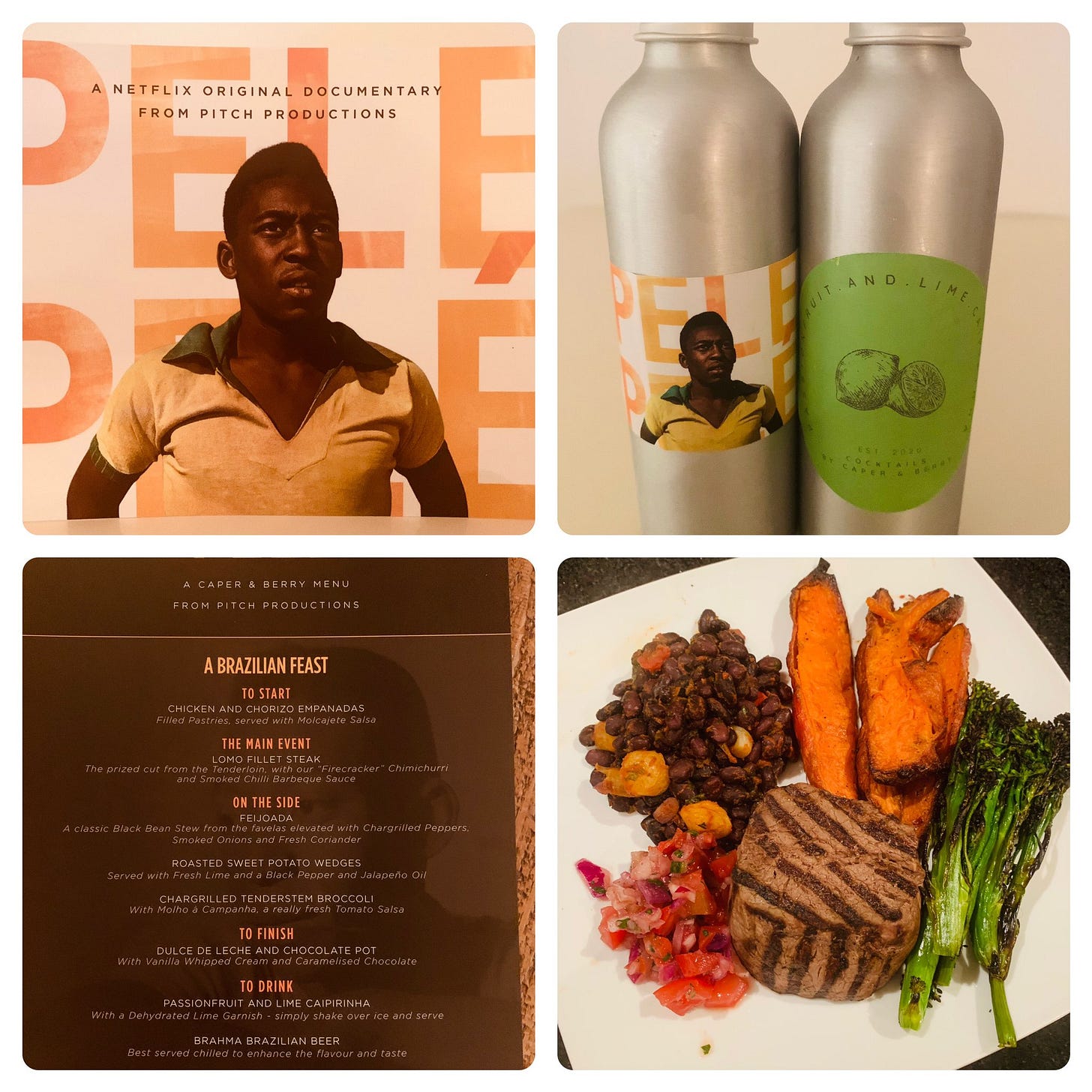The making of Pelé; Covid film premieres; the role of Noddy Holder's testicles in sports PR; Arthur Ashe's complicated activism; sports investor racism; measuring cultural relevance
The newsletter of the podcast
Tl;dr
The Making of Pelé podcast
Details that matter: Covid premieres
There are no bad ideas in sports PR
Can you measure cultural relevance?
Personal Best: Lona Price Jones
A founder’s story
Sportsbiz Objects No.9: The Arthur Ashe Monument
‘Demanding heroism from the neck of others’: Our expectations of Pelé, and how those changed
If you haven’t seen the new Pele documentary on Netflix, you should.
Like all great brands, Pele is a blank canvas on to which we project our own hopes, expectations and prejudices. Nowhere is this seen more obviously than in the sphere of athlete-as-activist.
The following snippet is taken from tomorrow’s UP podcast, The Making of Pele, a conversation with the film’s co-directors Dave Tryhorn and Ben Nicholas:
Unofficial Partner [00:11:00]: There's a theme in the film, which is the relationship between Pele and the vicious right-wing Junta that took over Brazil in the mid ‘60s. People have criticized him for not being more of an activist or that he was too willing to represent the regime, and I wondered what your view of it is, because it's a really complicated issue and certainly not as straightforward as it seems at a distance of sixty odd years.

Ben Nicholas [00:12:09]: This is something we came to from spending a lot of time with him and looking back at the rushes, and at what he did and what he didn't do.
Pele explodes onto the scene in the late fifties and for whatever reason, he really suits that time. He really understood how to be a star. And in the late fifties, early sixties, you really understood what people wanted from a star and we often compare him to a Hollywood actor from the old studio system; He's got that quality about him. So he saw his job was to turn up every week, be the best footballer in the world, represent Brazil around the world and smile for the camera. And he's unbelievably good at it. He gives the people exactly what they want. Then, as the mid sixties come along, I think what people want from a star starts to shift slightly.
You see people like Muhammad Ali emerge, the black power salute etc. And suddenly Pele's a bit of out step with that time..I would argue if you're Pele and everything you've touched has turned to gold for the first half of your career it’s quite hard to suddenly pivot and become a kind of radical figure who's challenging the establishment. But I think he rightly or wrongly decides that, ‘what I've been doing up to now has been working really well. I'm Pele. I'm going to stick to the plan’.
Dave Tryhorn [00:13:47] It’s also so, so important to think about his upbringing too. He comes from an obviously very humble background and he had a very, very stable family, which I think helped him cope with some of the pressures of fame, where other players perhaps didn't cope to the same extent.
And probably him becoming part of the establishment would have probably been the family's dream for him. That that's exactly what you need to become. So in a way he's fulfilling (his and his family’s ambition), he’s found the path that his family would have set out for him.
And then given his education and age, you wonder whether he felt equipped enough. Remember how young he was. Pele has got one of those faces and the haircut has always stayed the same, so we always think he's about 50 now. But when the military dictatorship came in Brazil in 1964, he was 23. When 1970 comes around and we see him as this veteran player, the gunslinger with one final fight, he's only 29.
And then there's this dangerous attempt to always try and compare Brazil with civil rights movements in the US in the sixties…but there wasn't that same precedent, that sense of ‘here's a movement I should get on board with’. No other players were making a stand, even the more educated ones like Tostao. So it wasn't like Pele was resisting a bandwagon to jump on.
Players now are beginning to see the power that they have, which is fascinating and it's great, but they have had the precedent of Ali all their lives…Pele was the first, he didn't have that.
Ben Nicholas [00:15:49]: I think that's exactly it…LeBron James, Marcus Rashford, these days, players have got so many more examples to look to and say ‘Oh, maybe I could do this. Maybe I could do that. Maybe doing this will help me rather than harm me.
Dave Tryhorn [00:16:23]: Within all the press this week, there was an interesting article by a Brazilian journalist who called it, ‘Demanding heroism with the neck of others’. Being a rebel or a hero or an activist is quite complicated. We all want our heroes to be radicals, but it's very easy to say that from the comfort of our own home.
Details That Matter: A Covid Premiere
Exam question - how do you recreate the film’s launch moment when we can’t go to the cinema.
Film premieres are a brilliant attention grabbing device, a signal that something big’s happening; Now, tonight. It’s a concept that’s worked since movies have been a thing.
But Covid has fucked with the model and attention to view is really hard to achieve on Netflix and the streamers.
So HT to Pele producers Pitch International and its PR agency WDW Entertainment for solving the riddle with home delivery and extreme labelling.
Note the avalanche of pre-release press coverage as evidence that something working.
Fwiw, this piece by Jonathan Liew in The Guardian was my pick of the bunch.
They even sent Sean something, which seems like overkill tbh.
See also: 17 ways to plug a film online.
And: that time Vice sent a non-film journalist to a movie junket.
Deeper still: In a recent court case, a journalist accused the Golden Globes of being loaded in favour of big film companies who use marketing spend to keep out smaller films. She lost.
There are no bad ideas in sports PR
Submitted by Laura Weston, who worked on the 2005 launch campaign for Nobby’s Nuts featuring Slade frontman Noddy Holder and actress Jennifer Ellison.
The campaign line was ‘It’s Nobby’s not Noddy’s’ (geddit?).
With a creative HT to that Vinnie Jones/Gazza pic.
Working it: You can’t say Noddy didn’t put a shift in.
When asked whether the campaign undermined his reputation as a singer songwriter, Noddy said:
"I don't mind people shouting, 'Nibble Noddy's nuts' at me. To be honest, it will make a change from, 'It's Christmassssssssss'."
Measuring cultural relevance
Hear this week’s UP podcast with Rich Adelsberg and Owen Laverty from Ear to the Ground.
Personal Bests
Sportsbiz people list their favourite things
Lona Price Jones introduces Rik Mayall to Michael Jordan over the UP prawn cocktail starter.
Sports investment in the 21st century: “This made me think, what kind of world are we living in?”
Amit Singh Rathore’s Founder story is a journey from rural India to Oxford University and on to a stellar career in blockchain, digital/cryptocurrency, IBM tech patents and football.
“I come from a small tribal village of central India called Jhabua. Growing up playing football on rough gravel filled grounds, I had never seen, or felt the need for, green pitches, that was the kind of passion I had for football.
And just in case you question why the issue of diversity in business is important:
Sportsbiz Objects
No.9 The Arthur Ashe Monument
#Activism #Purpose #Nostalgia #Memory #Statues

Famous black athletes face two criticisms when it comes to using their voice to support political causes: They're either too loud or they're too quiet.
In the first group we can put Tommie Jones, Serena Williams and Colin Kaepernick, who’s activism can often be resented (When white sports fans turn on black athletes).
Pele is in the second group, accused of copping out, shirking responsibility to a bigger movement, failing to maximise their fame as a campaigning platform, or in the cases of Michael Jordan and Tiger Woods, of putting money above cause.
The great Arthur Ashe personified this dilemma. (Hear our podcast with Donald Dell, Ashe’s long time agent and friend).
Ashe was the first black man to win a tennis Grand Slam, the 1968 US Open, followed seven years later by his win at Wimbledon, in 1975.
It’s tempting to jump to the end of the Arthur Ashe story, and paint him as a pioneering athlete-as-activist, which he obviously was. But my conversation with Dell was an insight in to the complicated reality of using sporting celebrity as a political platform. After ‘68, the pressure on him was immense. Jesse Jackson said Ashe lacked the “arrogance” to be a great activist. Billie Jean King once said: “Christ, I’m blacker than Arthur”.
Dell says Ashe was often misread, as shy or arrogant; when really he was too smart and too much his own man to want his personal views hijacked by someone else’s agenda.
“The problem of leadership continues to plague black America” wrote Ashe in his autobiography Days of Grace.
He worried that the tactics used by leaders of Black Power groups were for the most part ineffective. “Leaders of Black Power groups were brave young men lacking important characteristics of an influential leader such as vision, learning, experience, and the wisdom that age often brings” .
Ashe died in 1993 after contracting AIDS via a blood transfusion. People Magazine interviewed the player after he announced his diagnosis.
As the reporter was walking out the door she asked: “Mr. Ashe, I guess this must be the heaviest burden you have ever had to bear, isn’t it?” He responded: I thought for a moment, but only a moment. ‘No it isn’t. It’s a burden all right. But AIDS isn’t the heaviest burden I have had to bear… You’re not going to believe this but being black is the greatest burden I’ve had to bear…No question about it. Race has always been my biggest burden. Having to live as a minority in America. Even now it continues to feel like an extra weight tied around me.’
Deeper dive: Stand Up and Be Counted: The Black Athlete, Black Power and The 1968 Olympic Project for Human Rights
And: this is fantastic: The Complicated Activism of Arthur Ashe
Enjoy this newsletter? Tell your friends
Subscribe to the Unofficial Partner podcast.
Help us game the Substack algorithm by liking this newsletter and spread the word on social media.
Follow @RichardGillis1 and @PaulPingles (aka the ill-judged Twitter handle of Sean Singleton, the UP co-founder).
Read over 100 gushing five star reviews for UP on Apple Podcasts - click the link to add yours.













